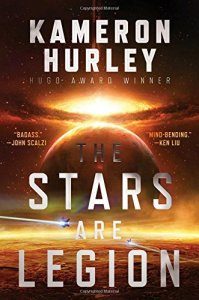Paul Di Filippo Reviews Zero Bomb by M.T. Hill
 Zero Bomb, M.T. Hill (Titan 978-1-78909-001-7, $14.95, 304pp, trade paperback) March 2019.
Zero Bomb, M.T. Hill (Titan 978-1-78909-001-7, $14.95, 304pp, trade paperback) March 2019.
The byline M.T. Hill is a not-too-opaque screen for the writer Matt Hill, whose two previous books under that name have been The Folded Man (2013) and Graft (2016). I mention this fact only because his third novel, Zero Bomb, is so good that you will want to snatch up copies of the first two, as I just did, and not fail to make the connection between what at first appear to be two different writers. Changing one’s byline nowadays is often a marketing strategy, but it would be a shame if it sent earlier books into oblivion and fogged the outline of a career.
In any case, what’s so fine about the new book to make you search out the forerunners? It features a not-unfamiliar and especially au courant theme — near-future societal and technological collapse — but presents it in so poignant and authentic and original a manner, with narrative flourishes galore (only one of which I will quibble over), that it feels fresh, insightful and powerful.
Part I opens in the year 2030, and focuses on a man, approaching middle age, named Remi. Due to a family tragedy — the death of his young daughter Martha — Remi suffers a mental breakdown and abandons his wife Joan and every aspect of his successful life. He becomes more or less a vagrant temp-worker, gets hooked on the drug spark, recovers, and begins to lift himself out of the pit of despair and nihilism. When the tale really kicks off, Remi is a bike messenger in London. (Of course, ever since Neal Stephenson’s Snow Crash, messengers afoot, on bikes or skateboards, or moving via some other mode of transport, have been rich symbolical figures in SF. If I can pat myself on the back a little, my own story “A Conspiracy of Noise” featured such a figure five years before Stephenson.) He lives a simple, spartan lifestyle, but is basically anhedonic and borderline depressed.
One day his current errand is short-circuited when a driverless car attempts to kill him. After that, the deluge. Remi is contacted by a cybernetic fox, who, we eventually learn, is named Rupal, and is one of the more charming personages in the story. The fox delivers a package to Remi with instructions for delivery. Arriving, coerced, at his destination, Remi discovers he has been enrolled willy-nilly in a conspiracy to topple the civilization of “automatic England.” His reward? A visit with his daughter Martha, who never died but is now a teenager. And by the way, the whole conspiracy is modeled on an old SF novel from 1971: The Cold Veil, by Laurel M. Brace. In fact, Brace might still be around and leading the movement.
Part II leaves Remi behind and gives us an abridged sample of The Cold Veil itself. It’s a spot-on rendition of such an artifact from a different era. (This tactic was also used recently to good effect in Tim Wirkus’s The Infinite Future. (Review here.)
Part III is a set of documents from the authorities further illuminating the conspiracy.
Part IV is the next-most substantial segment after Part I. The year is now 2032, and we follow the life of seventeen-year-old Martha as she lives in a strange commune that revolves around biohacking and cyberprosthetics. But her world is rapidly coming apart, and that stems from Remi’s actions. Will father and daughter ever reunite? Your guess will hardly match the reality.
Part V is a coda from the year 2041, after the “zero bomb” or “hard reset” has settled over the land, and depicts what might or might not be a utopian reboot of civilization. And this section constitutes my one grumble about Hill’s choice of multi-perspective telling. This section feels too bloodless — it’s in report form from a field operative of the authorities — and too removed from the characters he’s made us care about.
While Part II is great fun, and Parts III and V are useful and innovative infodumps, it’s the combo of Parts I and IV that truly delights and engages us. The depiction of Remi’s psychopathology, and the bizarre details of the zero bomb plot, all set against a very palpable near-future London of decadence and surveillance and makeshift survivalism ring very true. There’s a hint of Ballardian malaise as well. Martha’s life in the commune is like a Bruce Sterling extrapolation, and illustrates the generational divide between her and her father quite effectively. The intersection and fusion of their two timelines is touching and cathartic. All in all, the novel offers a parable of sin and salvation, on the personal and cultural levels both.
If Nick Harkaway had collaborated with Dave Hutchinson, the result might resemble what Matt “M.T.” Hill has accomplished solo.
 While you are here, please take a moment to support Locus with a one-time or recurring donation. We rely on reader donations to keep the magazine and site going, and would like to keep the site paywall free, but WE NEED YOUR FINANCIAL SUPPORT to continue quality coverage of the science fiction and fantasy field.
While you are here, please take a moment to support Locus with a one-time or recurring donation. We rely on reader donations to keep the magazine and site going, and would like to keep the site paywall free, but WE NEED YOUR FINANCIAL SUPPORT to continue quality coverage of the science fiction and fantasy field.







